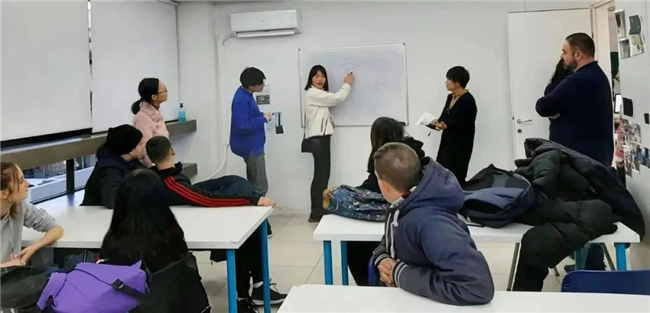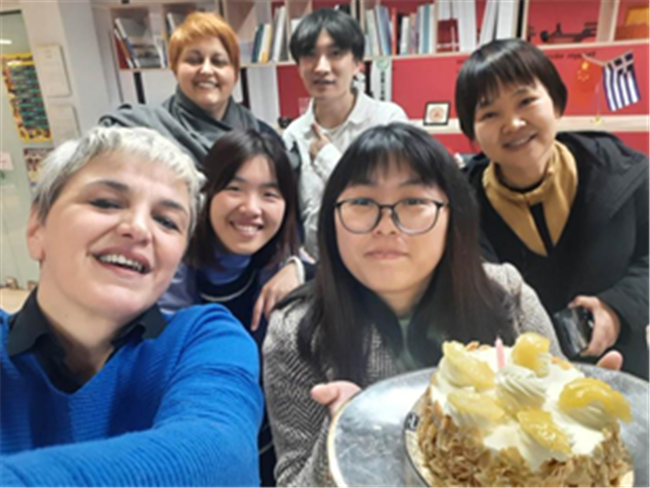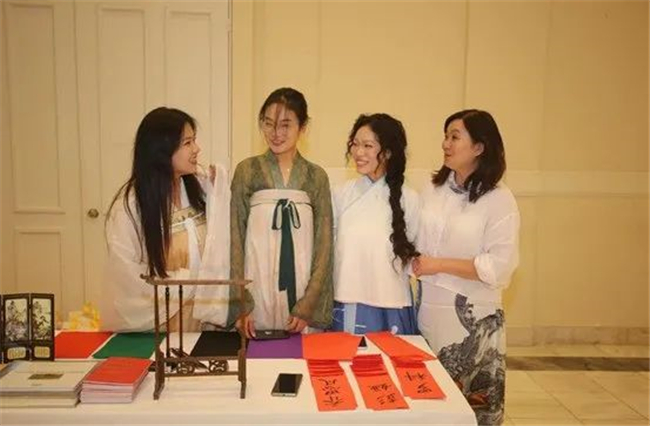Chinese Language Education in Greece: Language as a Bridge to Promote China-Greece Cultural Exchanges
Information Sources:People's Daily Overseas Edition
International Chinese language teachers and volunteer Chinese language teachers in Greece expressed their hope to build a bridge with language and contribute to promoting China-Greece cultural exchange and mutual learning of civilizations. They teach Chinese language, harvest friendship, and help the Greek people experience the charm of the Chinese language and culture.
Parents and children have Chinese lessons together
"It's very Lvcky of us to teach in Greece. The local residents are very warm-hearted towards Chinese people. The students respect their teachers and are enthusiastic about learning Chinese." When asked about the feeling of teaching in Greece, Lv Yiwen, an international Chinese language teacher, said with a smile.

Among the students taught by Lv Yiwen, some are college students, and many others already have a job. "I have gained a lot from communicating with students of different ages, and I am deeply touched by their enthusiasm for the Chinese language." She said.
Lv is impressed by a student who, a mother of five children, always appeared punctually at the door of the classroom on her motorcycle no matter how late the class was or how cold it was outside. The student not only finished all her homework in time, but also repeatedly reviewed the Chinese words she failed to remember. Even during the break, she liked asking Lv all kinds of questions about the language and China. “She said the process of learning Chinese was a reward for herself as she experienced the joy of pursuing knowledge.” Lv said.
Wang Ying, another international Chinese language teacher, is also deeply impressed by Greek students' enthusiasm for learning Chinese. "Besides actively participating in Chinese language classes and various Chinese cultural activities, the students also encourage their family and friends to learn Chinese. Therefore, it is not uncommon for parents and children to attend the same classes." She said.

Among the students taught by Wang Ying, there is one named Marina who is studying HSK3 online courses. One day, Marina sent a message to Wang, apologizing that she could not finish her homework on time because she was not feeling well. Only then did Wang Ying know that Marina's expected date of confinement was a week later, but Marina said she would continue to take Chinese lessons. Two weeks later, Wang Ying found that Marina was having with her online Chinese course while taking care of her newborn daughter, and she even handed in her unfinished homework. "I was deeply moved by Marina's dedication to and perseverance in learning Chinese, which inspired me to constantly improve my teaching skills and present wonderful Chinese language classes for the students." Wang Ying said.
Novel Chinese language teaching methods awaken the learning interest of the students
Chinese teachers in Greece spare no effort to improve their efficiency to teach the Chinese language.
Although Ruan Shuangying, a volunteer Chinese language teacher, has had online teaching experience in China, when she started to teach students face-to-face in Greece, she still "felt different".

Ruan Shuangying is a teacher in charge of the HSK 5 and HSK 6 courses. Her students have higher proficiency in the Chinese language and a strong interest in Chinese culture and contemporary China. In order to help them understand Chinese society and improve their language abilities, Ruan tends to choose real and interesting teaching materials that can attract the students and complement her teaching. "I use some online videos relevant to my lessons to show students the life of Chinese people, so that they can get a concrete understanding while practicing and improving their Chinese listening skills." Ruan said.
In her class, Ruan also engages the students in interactive games to enhance their learning enthusiasm and participation. For example, in the dictation session, she designed a group game to get the students involved; in the oral practice session, she asks students to practice through role-playing or debate.
Yang Yang, a volunteer Chinese language teacher, commented on her teaching experience in Greece, "It made me realize that I could help so many students learn Chinese, and teaching the language is really enjoyable."

Yang Yang's students are mainly adults with different learning purposes, but they are equally interested in the Chinese language and culture, and the classroom atmosphere is lively.
"After trying different teaching methods, I prefer to conduct situational teaching by drawing examples from local objects that are familiar to students. For instance, when making sentences, I will say, 'Class is over, some students are eating Greek food, others are basking in the sun'. This will make students feel more involved and shorten the psychological distance between us." Yang Yang felt very happy to help students learn Chinese and came to realize her responsibility and value in the process of teaching and learning.
Teaching and learning serve to benefit each other and build friendship
In the Chinese language teaching process, the teachers have also forged a deep friendship with the students.
"As a Chinese language teacher in Greece, I always get all kinds of help from school teachers, students and local residents." Every time Hu An, an international Chinese language teacher, passes by the coffee shop downstairs of his apartment, the owner greets him warmly and offers him free use of the shop's network before he gets the broadband. These small details make him feel "very warm" as a foreigner in Greece.

Wu Yilin, a volunteer Chinese language teacher, also felt friendliness and goodwill from the local residents. Wu's neighbor, a hospitable old man, often shares local delicacies with her and her colleagues, and has learned some simple expressions in Chinese from them, and he even hopes to learn more about China.

"Though we’re expats in Greece, we got closer to the local people through language learning and daily communication." Wu Yilin said.
(The photos in this article are provided by CLEC).

